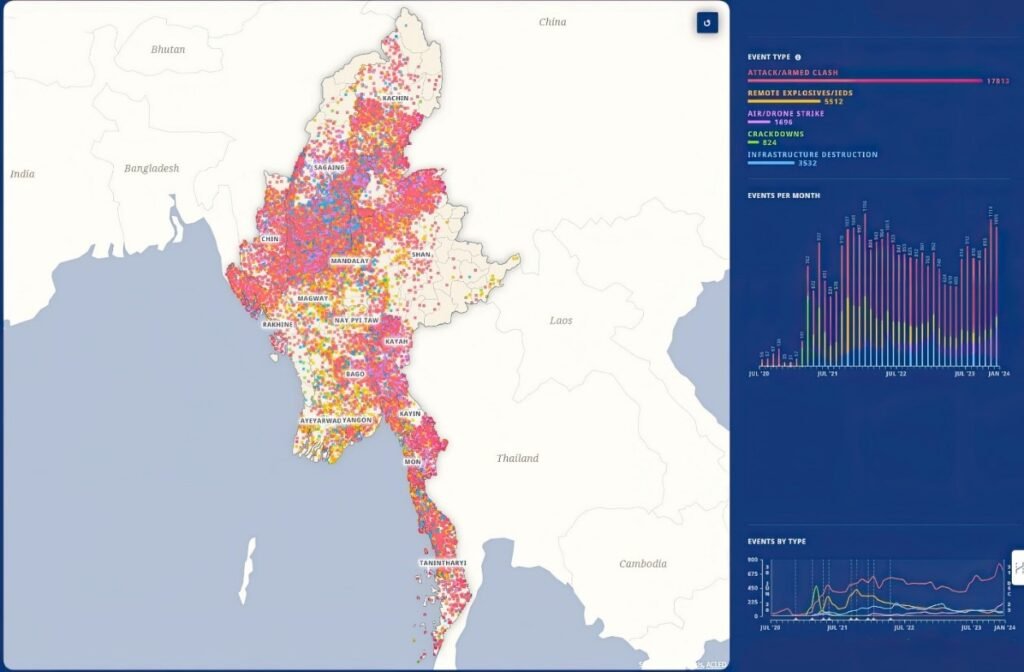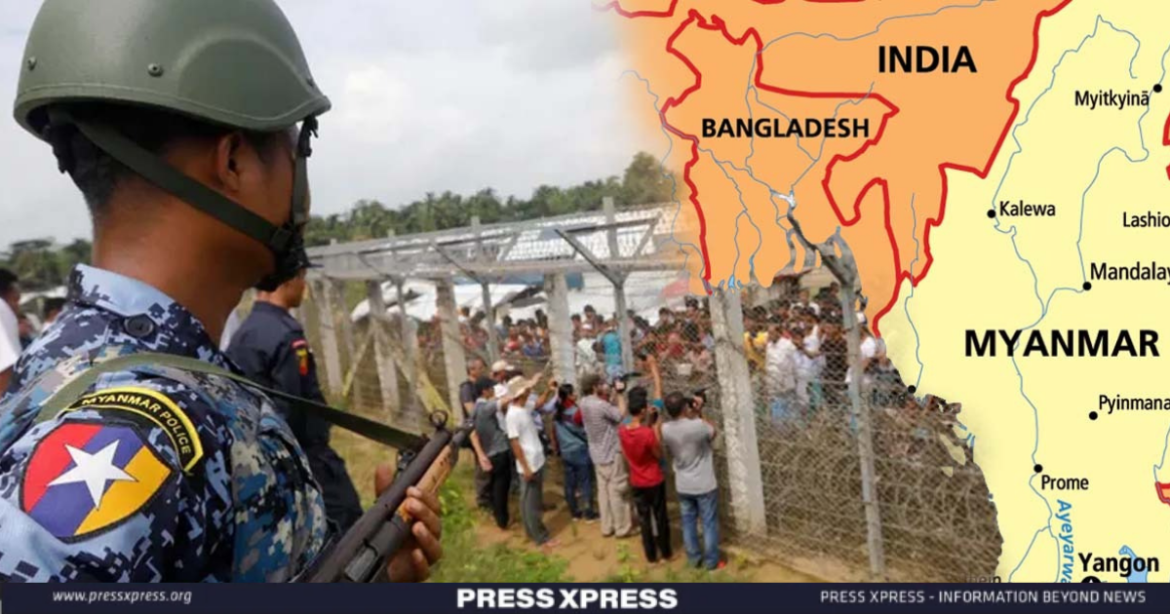Bangladesh and Myanmar are neighboring countries that share a long and complex history. However, the relations between the two nations have depreciated significantly in recent years, especially after the Rohingya genocide in 2017 that forced over a million refugees to flee to Bangladesh.

The situation has worsened since the military coup in Myanmar in February 2021, which sparked a civil war and a humanitarian crisis. The Myanmar junta has been accused of trying to wage a war against Bangladesh by employing various tactics, such as border violations, drug smuggling, and propaganda.
You can also read: 10 things to know about India’s election
The Rapid Action Battalion (RAB) Director General (DG) M Khurshid Hossain warned on Saturday, 24th February 2024, that Myanmar intends to create trouble and instability in the region.
Background
Bangladesh and Myanmar have a long history of border disputes and refugee issues. The two countries signed a demarcation agreement in 1979, but it was not fully implemented. Myanmar has also refused to recognize the Rohingya as an ethnic minority and has denied them citizenship and basic rights.
The Rohingya have faced persecution and violence from the Myanmar military and Buddhist extremists for decades, resulting in several waves of displacement to Bangladesh and other countries. The most recent and severe case was the Rohingya genocide in 2017, which the UN described as a textbook example of ethnic cleansing Bangladesh has been hosting over 1.1 million Rohingya refugees in overcrowded and vulnerable camps, despite its limited resources and capacity.
Civil war in Myanmar Spilling over to Bangladesh

The political and security situation in Myanmar deteriorated further after the military coup on 1 February 2021. The coup reignited the long-running civil war between the Myanmar military and various ethnic armed organizations (EAOs), such as the Arakan Army, the Kachin Independence Army, the Karen National Liberation Army, and the Ta’ang National Liberation Army. These EAOs have formed alliances with the anti-coup movement and the National Unity Government, a shadow government formed by the ousted lawmakers and activists. The civil war has intensified and spread across the country, resulting in more casualties, displacement, and human rights violations.
The civil war in Myanmar has also spilled over to Bangladesh, as the Myanmar military has repeatedly violated the border and fired shells and bullets into the Bangladeshi territory. Several incidents have occurred since February 2021, causing deaths, injuries, and damages to Bangladeshi civilians and security forces. The Myanmar military has also been accused of planting landmines near the border to prevent the Rohingya refugees from returning.
Myanmar’s Provocation of Bangladesh
Apart from the border violations, Myanmar has also been trying to provoke Bangladesh by employing other tactics, such as drug smuggling, propaganda, and diplomatic pressure. Myanmar is one of the world’s largest producers of illicit drugs, such as heroin, opium, and methamphetamine. Myanmar has been using the drug trade as a political tool to destabilize and undermine its neighbors, especially Bangladesh.
Myanmar has also been spreading propaganda and misinformation against Bangladesh, especially regarding the Rohingya issue.
Myanmar’s Motives and Implications
The question arises as to why Myanmar is trying to incite a conflict with Bangladesh by employing these various tactics. One possible motive is that Myanmar is facing a severe political and economic crisis, and is facing widespread civil war and resistance from its own people and the international community.
By creating a conflict with Bangladesh, Myanmar may hope to divert the attention and resources from its internal problems and to rally and unite its people behind a common enemy. Another potential reason could be Myanmar’s pursuit of a strategic and geopolitical agenda, aiming to broaden its influence and advance its interests within the region. By creating a conflict with Bangladesh, Myanmar may hope to gain access to the Bay of Bengal, secure its energy and trade routes, and counter the growing presence and role of China and India in the region.
Steps Bangladesh has Taken
Given the gravity and urgency of the situation, Bangladesh has taken various measures to ensure security across the Myanmar- Bangladesh Border Region. On February 8th, Obaidul Quader, the Minister for Road Transport and Bridges, announced that the government has bolstered its presence along the border to alleviate the strain caused by Myanmar’s internal strife. Lt Com. Lutful Lahil Majid, commander of the Teknaf Zone Coast Guard, also stated that steps were being taken to ensure maritime security across the border:
- BGB Patrols have intensified and increased across the border.
- Coast Guard patrol has increased across the Naf river
- Escorting of Civilian Vessels Near Myanmar Maritime Routes Like St Martin
- 24-hour maritime patrols
- Extra manpower allocation to beef up security
Bangladesh Must Pursue Peace
While Bangladesh should be prepared and vigilant, Bangladesh should pursue a peaceful and diplomatic approach for several reasons. Some of these reasons are:
- Bangladesh is a peace-loving and responsible country that respects the principles of international law and human rights. Bangladesh does not have any aggressive or expansionist ambitions and does not interfere in the internal affairs of other countries.
- Bangladesh is a developing and aspiring country that has achieved remarkable progress and growth in various sectors. Bangladesh should not jeopardize its development and prosperity by engaging in a war with Myanmar, which would divert its resources and attention from its priorities and challenges.
- Bangladesh is a diverse and tolerant country that hosts and accommodates people of different religions, ethnicities, cultures, and backgrounds. Bangladesh has also shown compassion and generosity to the Rohingya refugees, despite the difficulties and burdens. Bangladesh should not compromise its harmony and solidarity by engaging in a war with Myanmar, which would create hatred and hostility among its people.
Conclusion
In conclusion, Myanmar’s provocations are a serious threat to Bangladesh’s security and sovereignty and a challenge to the peace and stability of the region. Myanmar has been trying to wage a war against Bangladesh by employing various tactics, such as border violations, drug smuggling, and propaganda.
Bangladesh should also be careful and wise not to take Myanmar’s bait and to avoid any unnecessary escalation or confrontation. Bangladesh should uphold its image and reputation as a peace-loving and responsible country, and pursue a peaceful and diplomatic approach to resolve the issues with Myanmar.


